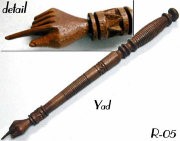Eastern worshipers are sometimes shocked to see a Bible treated like a common book, lying on the floor or under a chair, in public gatherings and even in churches. Nobody appears to pay attention to how and where a Bible is placed.
In Eastern cultures religious books are respected and honored very highly. In Pakistan, the current blasphemy law (Pakistan Penal Code 295-B) forbids the defiling of the holy book of Islam by casual use or placement. The punishment for defiling is life imprisonment!
Muslims call Christians and Jews “People of the Book” to identify them, although all three religions honor sacred texts. Jews regard the Torah very highly. They don’t touch it with their bare hands, so to read the Torah they use a “yad” (Hebrew for “hand”) or “Torah Pointer,” a reading stick with a pointed finger on the end.

Christians in Pakistan also treat the Bible with high respect and honor. Every Christian family has a Bible, whether they are able to read or not. The written word of God is a sign of their faith, so they keep it elevated on a high place at home and in the church. Some use a special cloth cover designed with beautiful art work to honor it and keep it clean. If a Bible falls to the floor by mistake, they pick it up, kiss it and put it back on its high place. Sometimes illiterate believers use the Bible as a defense against fear, even sleeping with the Bible beside their pillow or on their chest. Bibles are also used to prove a person’s integrity in the courts, or as a witness in family or social events, like weddings, when vows are made while putting their hands on the Bible. Oaths in the parliament are sometimes taken on the Book. (This practice is often done in some Western countries when presidents and other high officials are sworn into office.)
We need to teach our children how to treat the Bible with respect. Not just physically, but spiritually. When I was young, my mother did not allow me to eat breakfast until I read the Bible and prayed. Parents need to challenge their kids to use the 3-B formula: “Bible Before Breakfast.” Prayer and scripture reading at the beginning of the day is a very ancient practice. When giving the commandments, God told the Israelites, “These commandments that I give you today are to be upon your hearts;” “impress them on your children” (Deuteronomy 6:6-7). God commanded Joshua as the leader of Israel, “Do not let this Book of the Law depart from your mouth; meditate on it day and night, so that you may be careful to do everything written in it” (Joshua 1:8). During the first reformation and renewal in Judah, the God-fearing king Josiah (622 B.C.) “tore his robes” when he rediscovered the Book of the Law in the Temple of the Lord. King Josiah was humbled and responsive, so he renewed the covenant and initiated a reformation in Judah (2 Kings 22-23). In Nehemiah 8, after the return from exile, all the Israelites gathered to listen when Ezra opened the Book of the Law of Moses, standing on a high platform built for the occasion.
Some may say that the Bible is just a book, with paper and binding like any other book. But if the Bible is the word of God and the “bread of life,” God is using printed paper to speak, nourish and guide us. The published Bible is a witness to the living Word of God, Jesus Christ. . How can we best revere the written word of God? One way is to treat the Bible with respect and to handle with care. Another way is to consider using the 3-B practice, for adults as well as children; not only practice “Bible Before Breakfast,” but also “Bible Before Bed.” All Christians can benefit from this practice.

